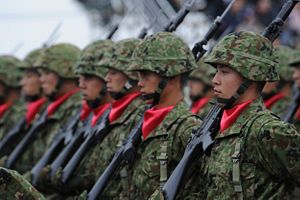Discussions with Japanese officials and analysts indicate that U.S. President Barack Obama’s public assertion that the Senkaku/Diaoyu Islands are covered by U.S. obligations to Japan has failed to dent Tokyo’s doubts about America’s credibility as its protector against China.
Some angst is unavoidable. A variety of factors guarantee with near certainty that the U.S. will fight China if it attacks Japan, but question marks will always remain. And even if the U.S. commitment is watertight today, no one can predict what the future holds.
Washington’s about-face over Syria led many to downgrade the value of American lines in the sand. Syria, unlike Japan and Korea, is not and has never been a U.S. core interest. It’s unclear how American goals would be served by the replacement of the Assad tyranny with an Al-Qaeda theocracy. To his credit, Obama realized his mistake before it was too late. This spared the U.S. and Japan an Iraq-type crusade that would have drained American resources away from East Asia. Nevertheless, Obama’s inability to grasp these facts from the start damaged American standing. Ukraine is also mentioned as an example of American weakness. But in this case, the U.S. never put the military option on the table. Additionally, most European NATO nations have so far made it clear that they will abstain from serious sanctions, limiting U.S. options.
There are steps that Washington could take to reassure Tokyo. The most sensational would be to station U.S. Marines on the disputed islands. Like the Berlin Brigade (U.S. Army units stationed in West Berlin), this would create a tripwire against Chinese invasion. But at this point, even hawkish Japanese leaders would oppose such a deployment.
The United States could also increase dramatically the size and capabilities of its forward-deployed assets in Japan, but this would entail significant financial costs.
Another option, which is in the hands of Japanese rather than American citizens, would be to boost the power of the Japanese Self-Defense Forces (SDF). Though on paper China has a bigger GDP, Japan’s military potential compares well. It is technologically more advanced, has a more stable political system, and doesn’t need to devote massive armed manpower to internal security. Thanks to the U.S. alliance and close relations with U.S. partners, it has access to the world’s best arsenals when purchasing weaponry. Japan would still require extended deterrence from Washington, but its level of dependence on the U.S. would decline.
Under this scenario, Japan would provide a greater share of its own security. Concerns about the willingness of Americans to fight for Japan would diminish as the percentage of “made-in-U.S.A components” of Japan’s defense would get smaller.
There are, however, a host of reasons why this is unlikely to happen. First and foremost, Japan is a democracy whose voters dislike military spending. Moreover, the Abe Cabinet refuses to make a massive and electorally very risky investment of political capital to try to change this. Instead, it has focused on non-security issues and on financially costless new interpretations of constitutional texts whose impact on national defense may turn out to be negligible.
In his inaugural address in 1961, President John F. Kennedy (father of the current American ambassador to Japan, Caroline Kennedy), offered this advice: “My fellow citizens of the world: ask not what America will do for you, but what together we can do for the freedom of man.”
If the situation were reversed – if the U.S. depended on Japanese deterrence – American leaders would probably also focus mostly on minimizing America’s own efforts and rely as much as possible on their stronger ally. But this doesn’t alter the current situation: the Japanese cabinet’s barely hidden contempt for the American chief executive coexists with a “what will Obama do for us?” mentality. If the premier and his associates emphasized “what can we do for our country?”, misgivings about the president would not diminish but they would cause them far less heartburn.
Robert Dujarric is Director, Institute of Contemporary Asian Studies, Temple University Japan, Tokyo ([email protected])

































